Traveling to South Korea offers a unique experience, but finding the best time to visit can be crucial due to the peninsula's extreme weather conditions. Summers can be intensely hot, making outdoor activities challenging, while winters are harsh, often requiring heavy coats to stay warm. However, the spring and autumn seasons in Korea are exceptionally beautiful and comfortable, although they tend to be quite brief. To determine the best time to travel to South Korea, let's delve into the country's weather patterns and what you should wear to find the ideal period for your visit.
In South Korea, you can enjoy four distinct seasons. During the summer, the temperature can go up to 35 °C (95 °F), which can be annoyingly hot and humid. On the other hand, in winter, the temperature often falls below 0 °C and it gets very dry. The seasons between these two, spring and fall, are a bit short compared to summer and winter, but have the perfect weather to dress up and go for a picnic.
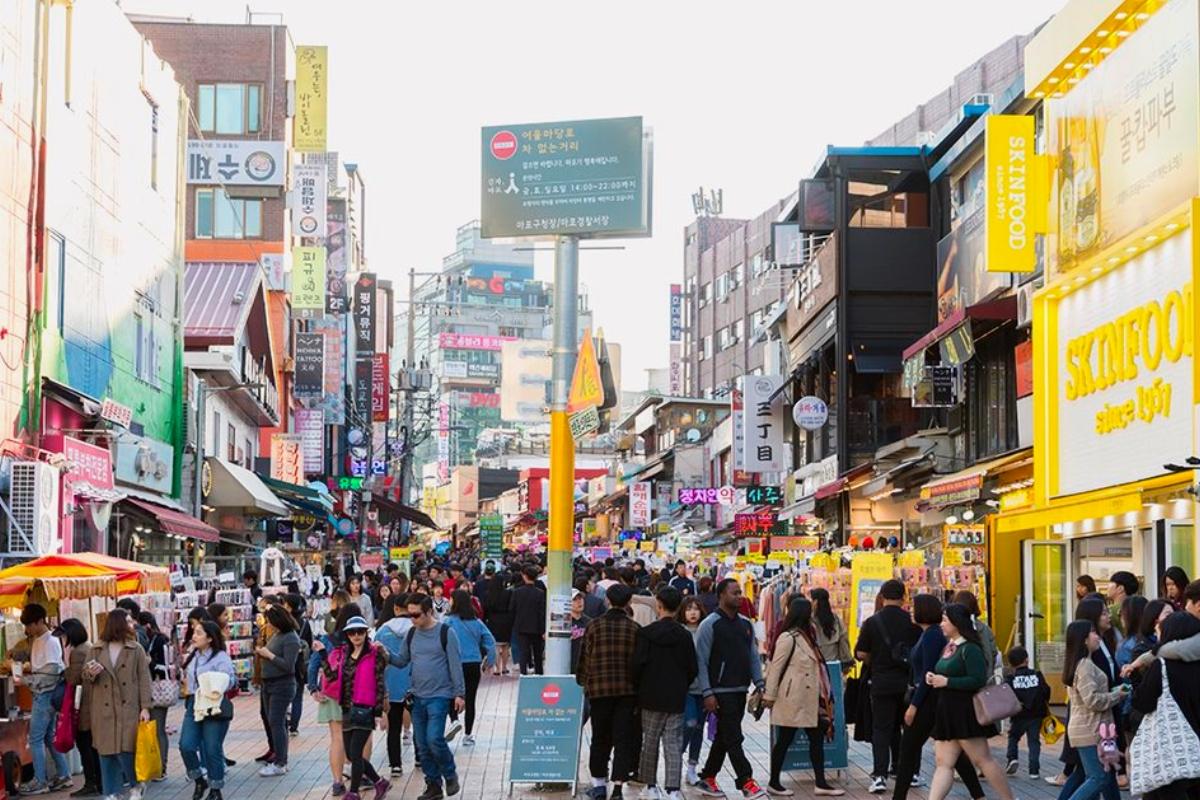
The annual temperature difference has a range of over 40 °C, and the daily temperature difference can be quite big during spring and fall. If you are lost on what to pack for your upcoming trip to Korea, read this blog and you will get an idea of what to expect!
Preparing for your spring trip to Korea? You should have your travel essentials ready! If you haven't purchased your SIM card, airport transfer, luggage storage/delivery, and other must-book travel essentials yet, do so on Creatrip for a special price! Click on the button below!
Summer
Months: June, July, August, September
Average Temperature: 22 to 38 °C (71.6 to 100.4 °F)
From May onwards, Korea's average temperature rises to 33°C, making it ideal for travel and outdoor activities. Summer begins in late June, followed by the monsoon in July. Post-monsoon, August brings intense heatwaves. For visitors, sandals and an umbrella are essential to cope with the heat and rain.

Around the end of June, South Korea enters the 'Haji' season according to the traditional solar calendar. Haji is the hottest season and the longest day of the whole year.

Below is the 2024 summer weather in Korea for reference.
June 2024 |
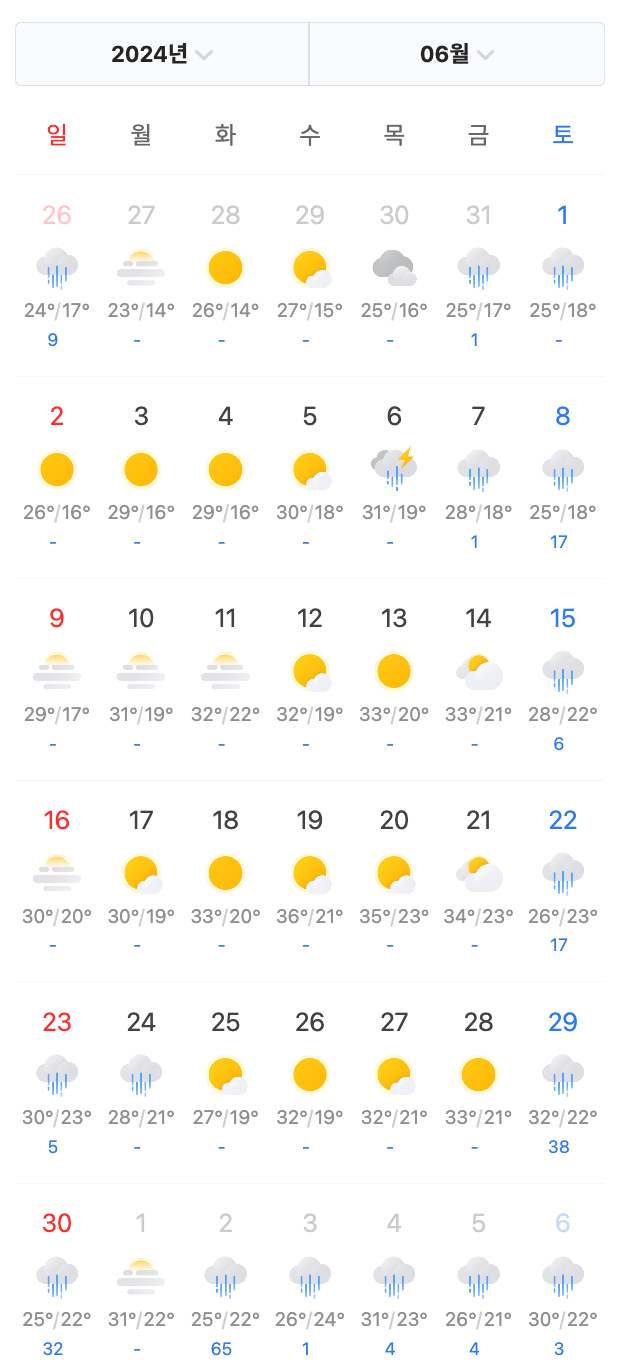 |
July 2024 |
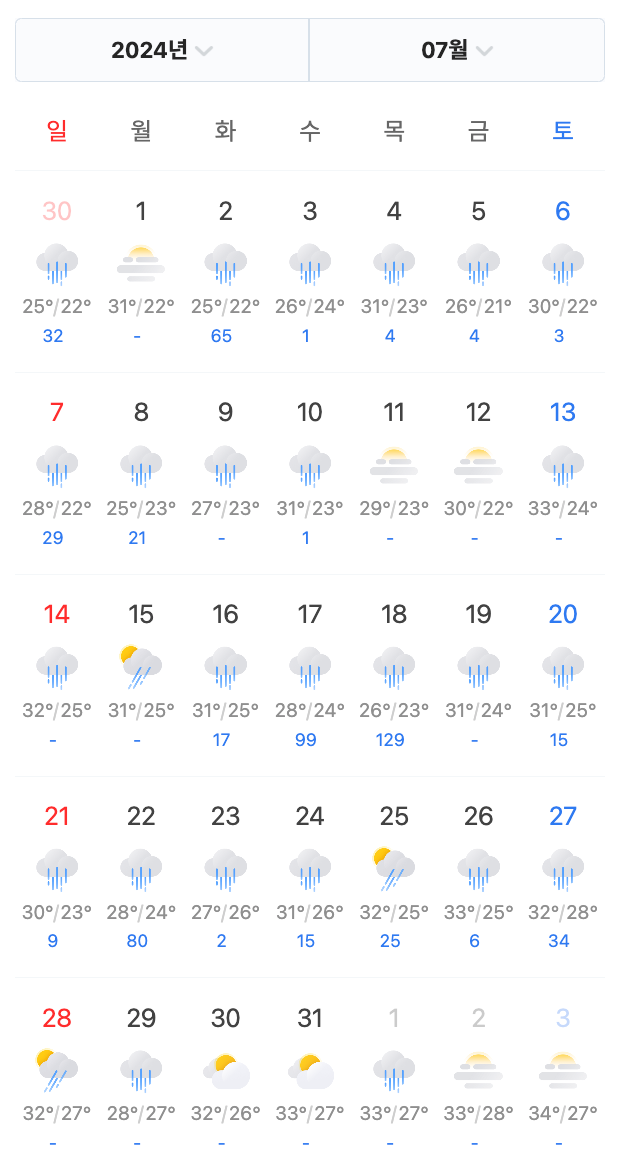 |
August 2024 |
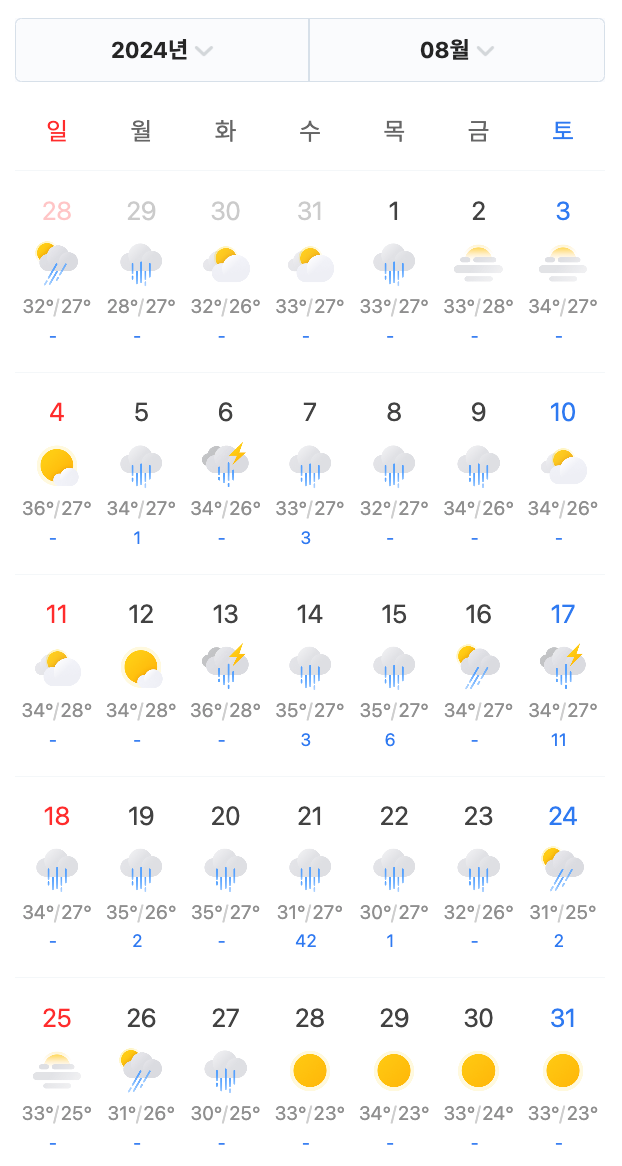 |
In June, South Korea's weather is still pretty cool, and you may still wear thin coats and long pants, even in Busan. However, post-rainy season, the humidity and heat make outerwear impractical. There's a noticeable shift: pre-mid-July temperatures hover around 33°C and are less humid, but post-rainy season sees a significant increase in both temperature and humidity. The hottest months in Korea are late-July and August. Temperatures can get unbearingly hot and humid so prepare knowingly.
Summer Fashion in Korea: (Women's fashion)
Visitors from the West might notice that Korean fashion tends to be more conservative in some ways compared to the U.S. and Europe, yet similar in others. For example, showing a lot of cleavage is uncommon in Korea, but baring shoulders and décolletage is perfectly acceptable. On the other hand, wearing leggings as pants might draw quite a few stares, while short shorts are a common sight.
If you're heading to a beach in Korea, you might find it unusual to see fewer bikinis, as many Koreans prefer to cover up from head to toe to avoid tanning, which isn't widely embraced. However, feel free to wear whatever makes you comfortable, regardless of local norms. It's worth noting that the younger generation in Korea is increasingly embracing bolder and more diverse styles.
Here's a list of summer essential items that will help you cool down in the summer!
Essential Summer Items in Korea
Fall
Months: September, October, and November
Average Temperature: 3 to 25 °C (37.4 to 77 °F)
In South Korea, fall, similar to spring, sees large day-night temperature variations. September days can reach up to 30°C, dropping to 15°C at night, so layered clothing is advisable. From October to November, temperatures fall sharply, often reaching lows around 0°C. The season is pleasant with cool breezes, ideal for light sweaters or jean jackets.
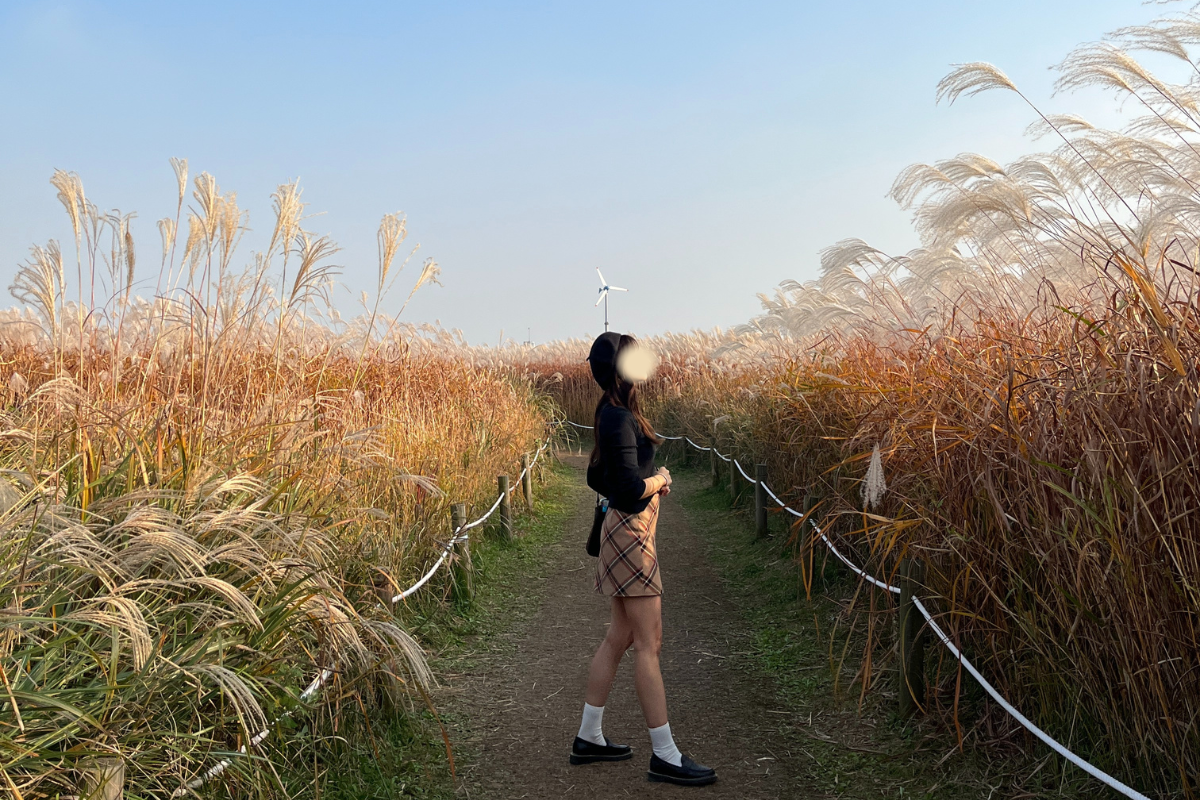
Autumn leaves begin to fall in late October, with the peak viewing period in Seoul from late October to mid-November. Mid-September to late October is the best time for fall foliage, with popular spots like Seoraksan. The weather is cooler and dry, making it excellent for traveling in Korea.
September 2023 |
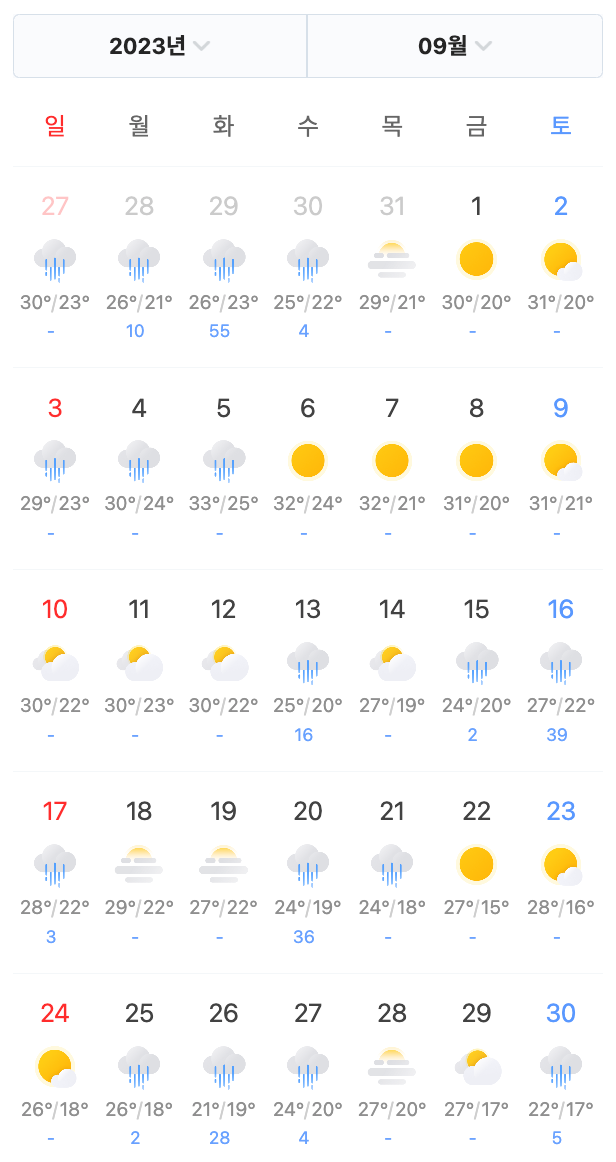 |
October 2023 |
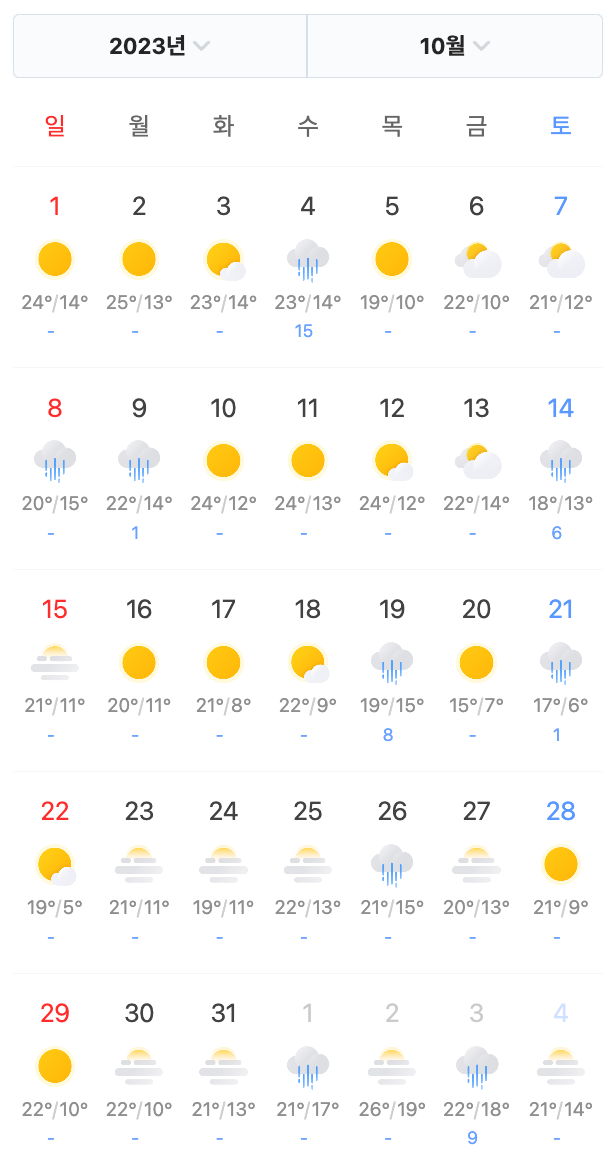 |
November 2023 |
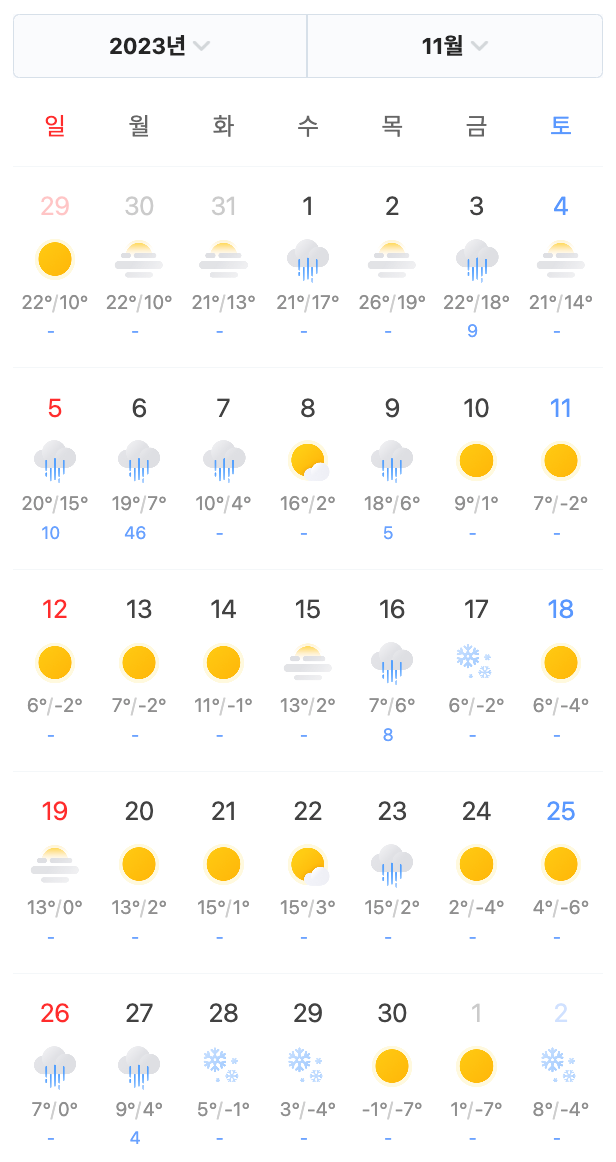 |

During fall in Korea, the temperature difference and flu season make it easy to catch a cold, so bring thin layers for your visit. Post-mid-October, temperatures drop rapidly. By November, ginkgo and maple leaves fall, with night temperatures often reaching 0°C. Early November marks autumn's end, with temperatures falling below 0°C. The weather is mostly sunny, with a dry, mild climate. It's not excessively cold or windy, but using moisturizer to hydrate your skin is advisable.
Winter
Months: December, January, February
Average Temperature: -15 to 5 °C (5 to 41 °F)
In Korea, the first snowfall typically occurs around late November to early December, but due to global warming, predicting the exact timing has become challenging. Recently, snow accumulation in Seoul has been rare. Post-mid-October, temperatures drop below zero, with nights getting progressively colder. By late November, thick winter jackets are necessary to stay warm.

Do you want to enjoy winter in Korea conveniently? Join a tour!

In Korea, the first snow typically arrives by early December, with temperatures frequently dropping below zero by month's end. The season is notably dry, so regular moisturizing is important.

January and February are the peak snowy months, though southern cities like Daegu or Busan see less snowfall. Korean winters, more humid than those in North America, may feel bone-chilling despite milder temperatures. For winter visits, heavy puffer jackets, gloves, and scarves are strongly recommended.
December 2023 |
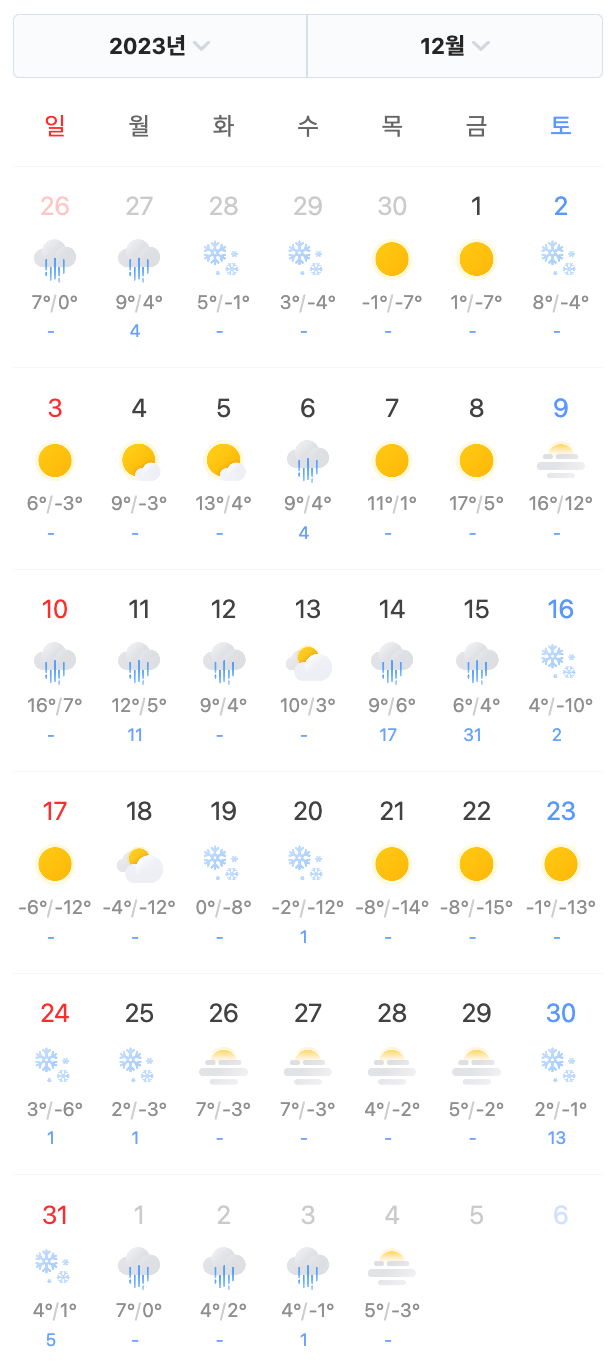 |
January 2023 |
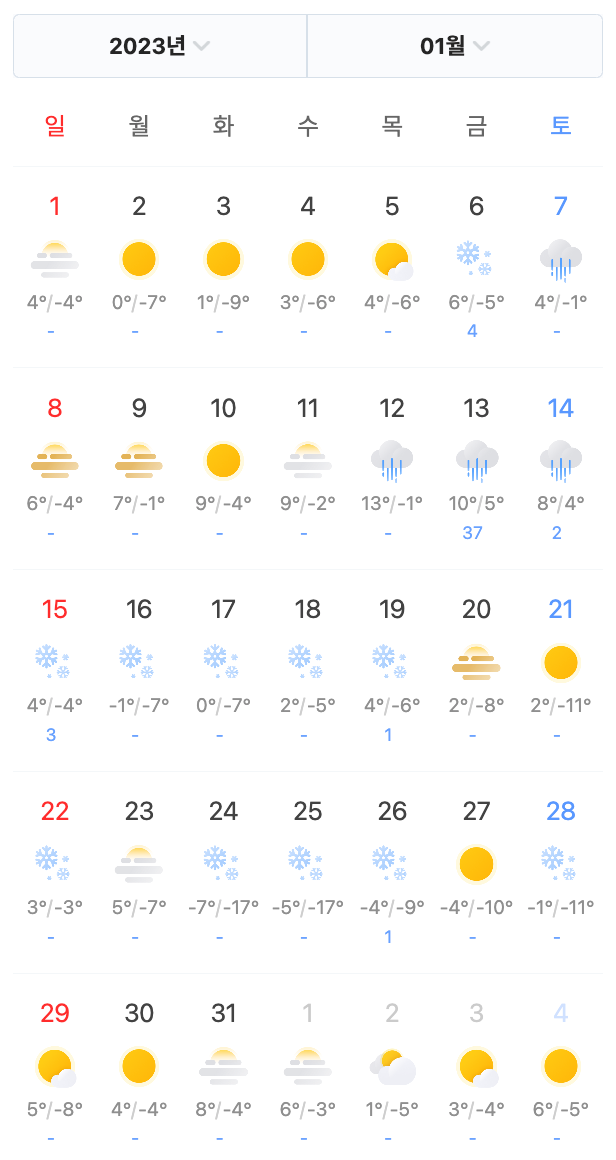 |
February 2023 |
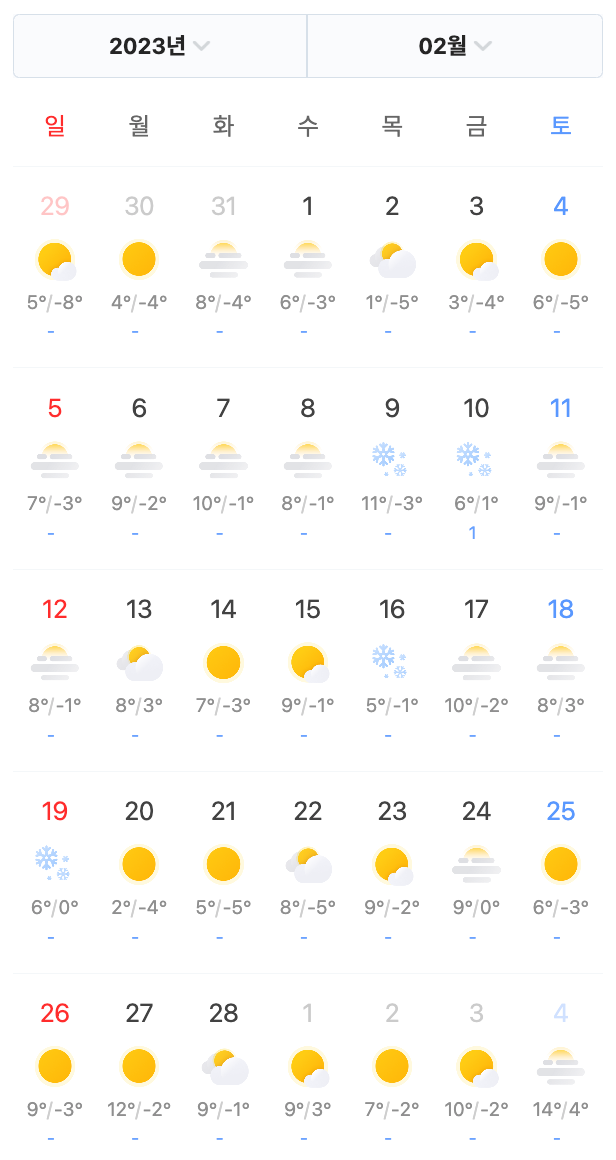 |
South Korea's Average Temperature Throughout the Year (in Celsius)
- 27 degrees or higher (July and August ): sleeveless shirts, short sleeves, shorts, sun protection, sunshade, and mini electric fan
- 17 degrees to 27 degrees (May, June, and September): short sleeves, and thin cotton coats
- 9 degrees to 17 degrees (April, October): long sleeves shirts, trousers, thin cotton coats, and thin jackets
- 5 degrees to 9 degrees (March, April (in the evenings), and November): thermal clothes, long sleeve shirts, trousers, jackets, and coats
- 5 degrees below zero (November (in the evenings), December to February): Warm winter clothes, and moisturizer
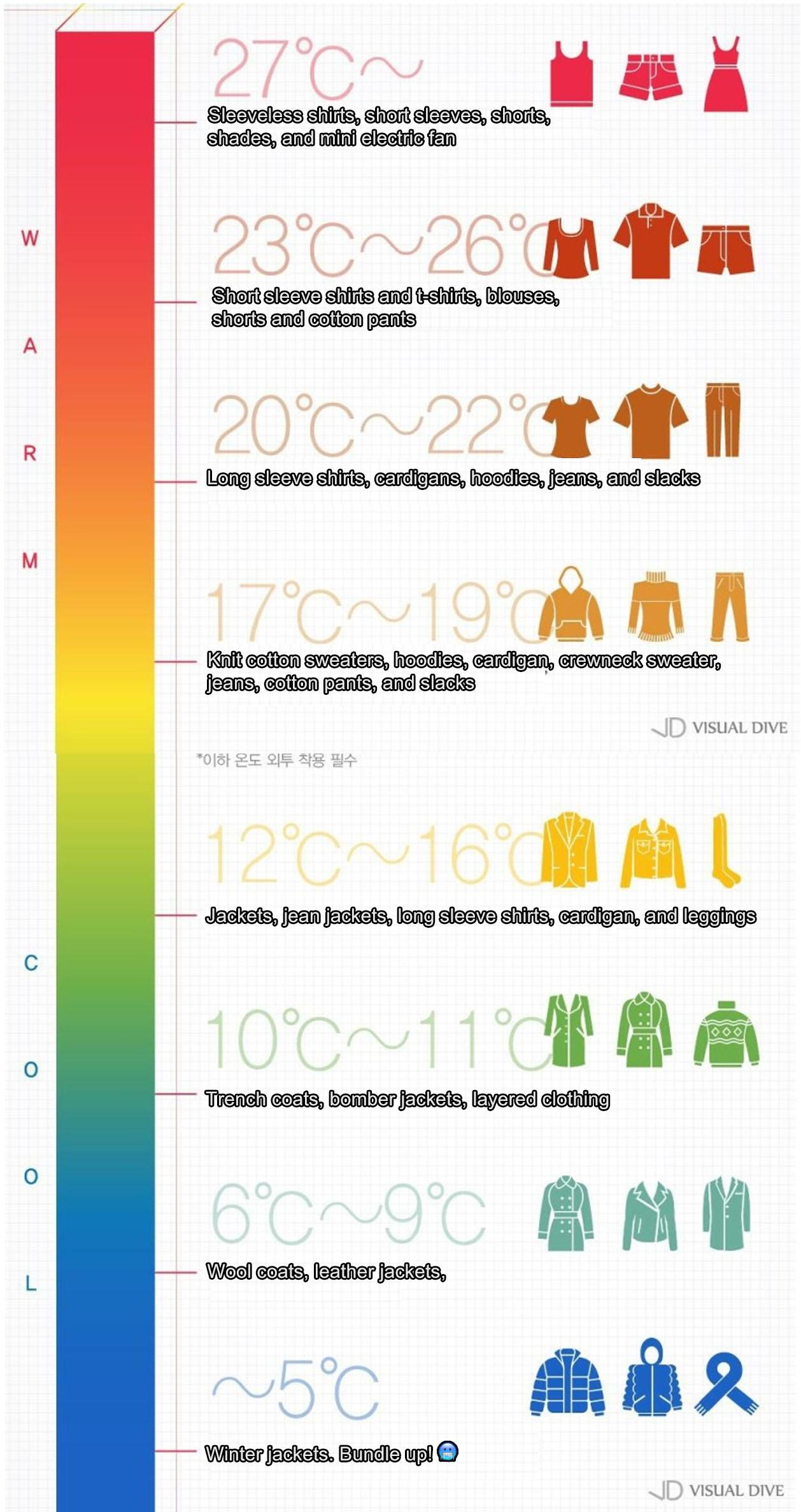
Spring
Months: March, April, May
Average Temperature: 0 to 22 °C (31 to 71.6 °F)
Korea begins to warm up in late March, marking the end of a long winter with blooming flowers. March often brings gloomy days and significant temperature fluctuations. April and May see steadily increasing warmth, averaging 22°C, ideal for experiencing Korea's spring beauty. April's cherry blossoms and May's royal azaleas are highlights of the season.

Let's take a look at the recent weather in Korea. The photos below is the weather in Korea during March, April, and May of 2023.
March 2024 |
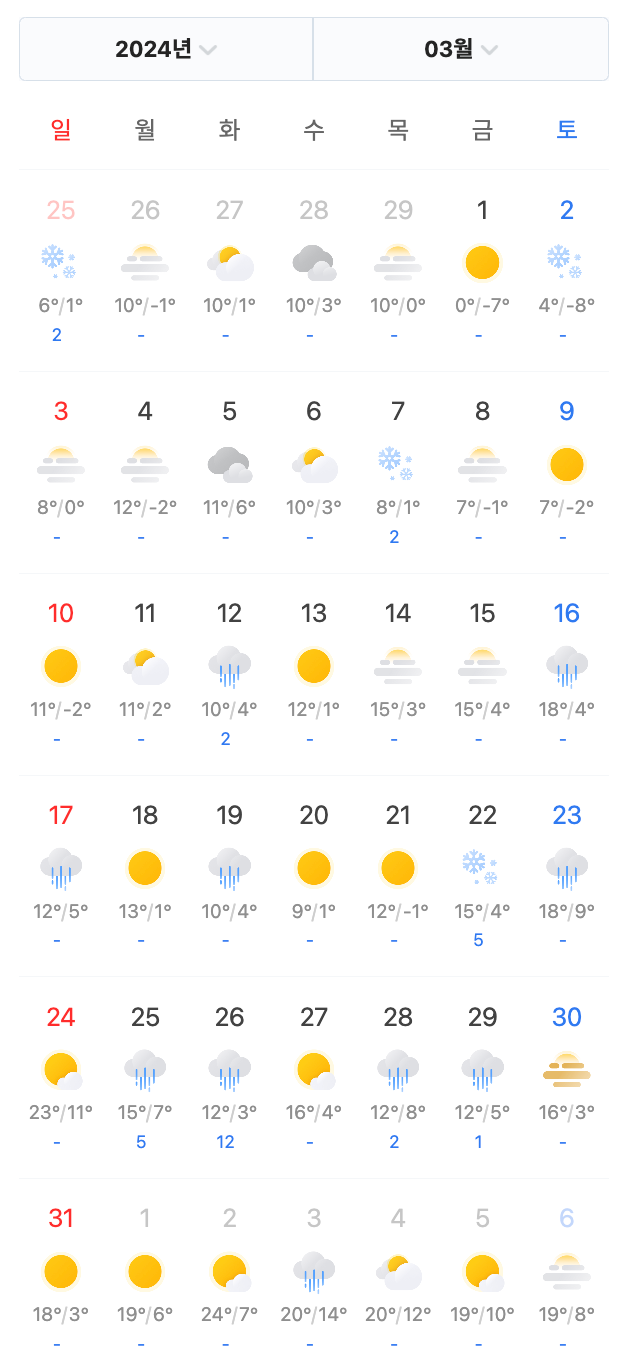 |
April 2024 |
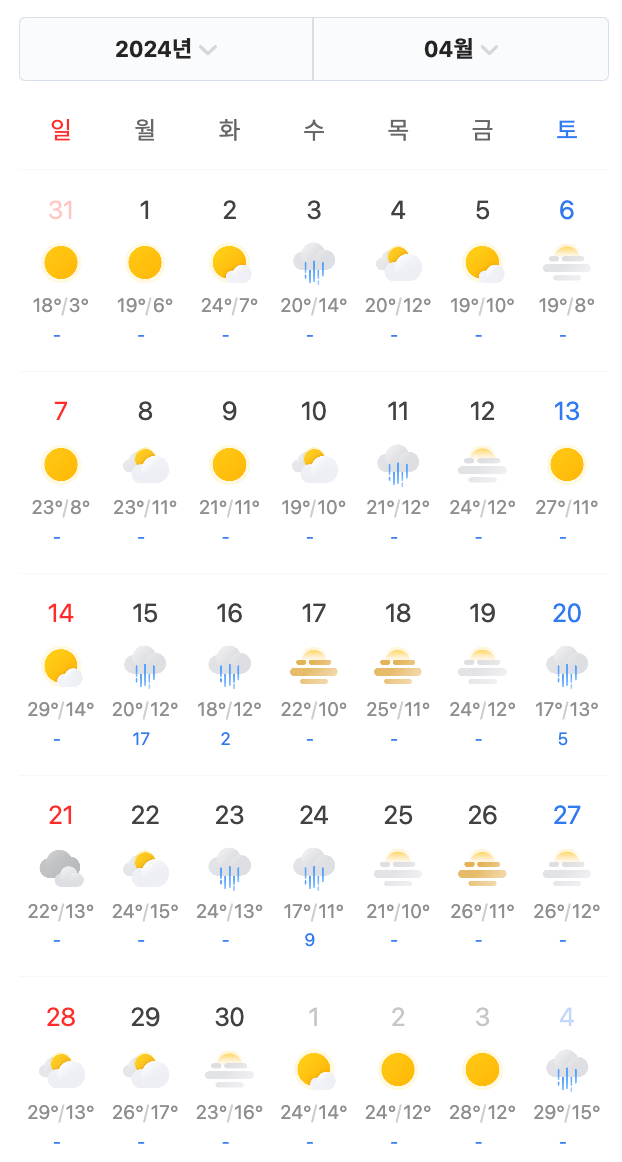 |
May 2024 |
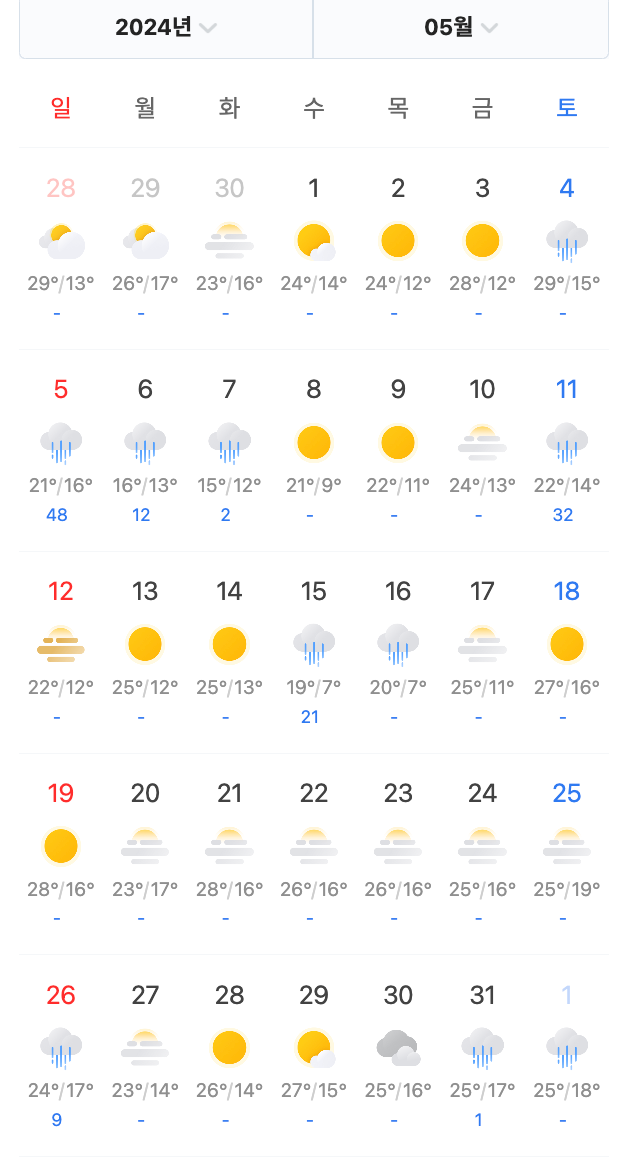 |
In spring, Korea's weather is changeable due to frequent rainfall. Layered dressing is recommended; a warm jacket and long pants are essential in early March, while April sees nicer weather with occasional rain and temperature drops. By May, short sleeves and shorts are suitable, but keep in mind the day-night temperature variation. Cardigans or jean jackets are spring staples.

For more content about spring in Korea, check out some of our blogs below!
South Korea in Winter | 2026
Are you ready for your trip to Korea? Click on the link below to check if you have everything prepared!
Are you ready to pack for your trip to Korea? We hope this information gave you an idea of what to wear and prepare. If you have any questions or concerns, please leave a comment below or send us an email at help@creatrip.com! You can follow us on Instagram, TikTok, Twitter, and Facebook to stay updated on all things Korea!
Book all things trending in Korea on Creatrip! If you have any questions or concerns, please leave a comment below or send us an email at help@creatrip.com! You can follow us on Instagram, TikTok, Threads, and Youtube to stay updated on all things Korea!




